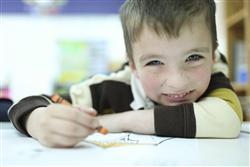Behavior and Attention Issues at School: Team Up with the Teacher!
By Guest Blogger Adrian Greene
In my ten-plus years of working with exceptional children in the public school system, one issue that I find recurrent year after year is that of students who struggle with behavior and attention issues. Most of my experience with this pattern of behaviors occurs in adolescents ages 11 to 16 during their school day. Students are sitting still indoors for a large part of the day where vast amounts of learning become the expected daily responsibilities of the child.
What is Attention-Deficit Disorder?
In our American society, where a medical diagnosis ‘magically’ unlocks doors to extra support from several government agencies including public special education, phrases such as “It’s my ADD.” and “Did he forget his ADHD meds this morning?” are common. The National Information Center for Children and Youth with Disabilities (NICHCY) defines Attention-Deficit disorder as a pattern of behaviors which manifest as a child who is “predominantly inattentive and, as a result, [has] great difficulty getting or staying focused on a task or activity, [whereas children diagnosed with] Attention-Deficit-Hyperactivity Disorder may be able to pay attention to a task but lose focus because they may be predominantly hyperactive-impulsive and, thus, have trouble controlling impulse and activity.” Still more children are diagnosed with Combined-Type, in which parents, teachers, and medical professionals report that the children they are observing exhibit both hyperactivity and inattention.
Doctor’s orders?
It is important to understand that, while a medical diagnosis of a behavior or attention abnormality can be very helpful to families in order to receive the supports that are truly needed, especially in a school setting, parents and teachers who work closely together in order to remain focused on the child underneath the label of ADD or ADHD will have the most success. While parents may opt for medications which have been proven to reduce symptoms, children can be successful in school and in life without medical diagnoses or medications, which are not one-size-fits-all.
Problems at School
Attention disorders are difficult because children who look so ‘normal’ on the outside often exhibit the most disruptive behaviors in the classroom setting, which lends itself naturally, and unfortunately, to a lack of compassion for these children. Teachers in a classroom of 25 to 30 students often find themselves having to interrupt instruction multiple times during even a 60 minute class period, to address bothersome behaviors from just one or two students, such as getting up out of a seat to walk around the room, tapping pencils on desks repeatedly, excessive talking, or daydreaming. It takes years of experience for teachers to become confident enough in their craft to cope seamlessly with these types of behaviors, and for some teachers, behaviors such as these will never be tolerable.
Parents who find themselves at the other end of a phone call from an exasperated teacher or school principal should remember that they are always their child’s strongest advocate. It’s easy as a parent to feel defensive when are children are being described as ‘disruptive to the learning environment’. Yet, it is important not to take this information as as personal attack from the teacher, neither on you, nor your child. Teachers really do want what is best for the child and will look to the parent for support, not displacement of blame or criticism of the teacher, which will likely only make the issues at school worse.
What Parents Can Do
- Have a real conversation with your child’s teacher. Schedule a face-to-face conference and discuss with the teacher as much as you feel comfortable with, including whether or not your child has a medical diagnosis of ADHD or ADD, and whether or not it is your personal decision as a parent to medicate your child to control their symptoms at school.
- Focus on your child, not the behavior or attention disorder. Share with the teacher some of the strategies you have found helpful at home, such as giving your child a fidget objects or stress-relief toy; most teaches welcome these items in the classroom as long as they are kept with your child only. Share things like how you get your child to calm down after a melt-down or outburst, or some of the positive behavior reinforcers that you use (such as extra video game time for a good day at school). These reinforcers can be easily replicated in the classroom setting.
- Ask for support from a behavior specialist. If your child does not require a specialized education plan or IEP, you can still seek the advice of special education teachers and staff in your child’s school or district to observe your child and offer advice and support to the regular classroom teachers.
The most important fact is that every child who exhibits inattentive or hyperactive behavior is still an individual child. Medications, therapies, interventions, supports and plans that work for one child will not necessarily work for another, even if the children exhibit similar behaviors. Remember that your child’s teachers are on your side, and will, more often than not, be fully receptive to any suggestions and approaches that you offer or can come up with together with the teacher. Celebrate together with teachers when your child has a good day at school, and make the most of the long days, that will inevitably turn into those very, very short years.







